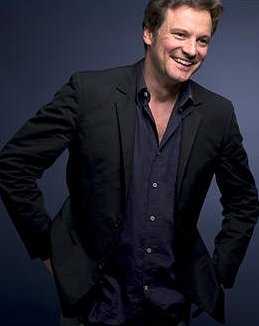His children do not call him Mr. Darcy. His private life is not lived in drawing rooms. He does not want to be buried in a Victorian smoking jacket, the way Bela Lugosi insisted on being dressed in his Dracula cape in the grave. Still, the British actor with the charming voice and impeccable manners is forever associated with Mr. Darcy, the love interest in the BBC adaptation of Jane Austen's Pride and Prejudice and the rival for Renée Zellweger's hand in Bridget Jones's Diary, not to mention the upcoming sequel. It's a burden he is happy to bear. "I would say the perks are stronger than the adverse effects," Firth said yesterday during a round of Toronto film festival interviews to promote his latest movie, Girl With A Pearl Earring. In that film, he plays Johannes Vermeer, the 17th-century Dutch painter. The movie is historical fiction and speculates on how Vermeer came to create the famous painting of the title, the portrait of a young girl turning to look provocatively at the viewer. The answer has something to do with rising star Scarlett Johansson, who plays an alluringly innocent maid in the Vermeer household. Firth's role is almost silent; his Vermeer has long hair and a week-old beard, and he works quiet hours in his studio obsessing over colours. He is not Mark Darcy, but neither, says Firth, is the role a real departure for him. "I don't think it's enough of a departure to call it a departure," he enunciates in a voice that was trained for the British stage before it found its place in a series of romantic films. "I've played a fairly taciturn character in period drama before. But not quite like this." Because not much is known about Vermeer, Firth had to invent him from looking at his paintings—which are so scattered around the world that the prospect of "visiting all the Vermeers in the world" is used as a synonym for wide travel in the film Hannibal—and reading about his life. "The tacit nature of the character has been drawn somewhat on the tacit nature of the paintings. You have this sense of quiet in the work wi thin what must have necessarily been a chaotic household. There's no question about it, with 11 children running around. It was an active world. He grew up in a pub. The beer consumption was enormous. This was a world that wasn't as calm and tranquil as the paintings might lead you to believe." Firth said he found both the paintings and the character elusive, which was what drew him to a role in a movie that he thinks is a risk: will people want to watch a slow-moving story, designed as beautifully as a Dutch masterpiece, about how a famous painting was created? It's the kind of risk that Firth's success has allowed him to take. And the success is mostly due to the non-elusive Mr. Darcy. "He's certainly taken over my public life, and interviews. And he helps me get a table in a restaurant. ... I doubt if I would be doing Girl With A Pearl Earring right now if it wasn't for Mark Darcy." The actor—who co-stars in the upcoming Love, Actually with Hugh Grant, Emma Thompson and Liam Neeson, which had a work-in-progress screening at the festival last night—says there's no concern about being typecast in the Darcy role. "It's bigger than me anyway. It's fine. As long as it's not stopping me doing other things, which it clearly isn't at the moment. My own experience has felt very varied through it all. I would say it's very much an asset that's enabled me to be employed. It gives me a living. And it gives me a little bit of choice. It means I'm a little more feasible." The Austen role has turned Firth into something of an unlikely sex symbol: Mr. Darcy's charm and commitment to love, as well as Firth's wavy-haired good looks, have engaged thousands of female fans. Firth says he has heard this mentioned before, but he still has the grace to blush. "People have told me that sort of thing. Anybody would be flattered. I have pretty well the same reaction as any guy. Where do you meet these people?" His mysterious Vermeer may not provoke the same reactions -- the long hair, the subject matter, the non-romantic tone make it unlikely -- although he plays the role with the same undercurrent of decency familiar in all his performances. He says that he looks for that in all his characters because it's an actor's responsibility to humanize the people he inhabits. Firth, who lives in London with his wife, grew up in a crowd of art students, but he says he was the only one who didn't really understand visual art. He didn't know what he was supposed to look at in a painting. "I panicked a little," he says. "It didn't move, it didn't speak, it didn't sing, it had no narrative, and so I used to wonder where this impact was supposed to come from." He understood the impact for the first time when he walked into the Rothko Room of the Tate Museum in London one day years ago and was struck by the enormous canvases of Mark Rothko. Vermeer, he says, is the other artist who engages him, although in a different way. "Vermeer is much more obtuse in a way, much more inaccessible. And also there's a whole bunch of paintings of women with jugs of water and writing letters, and there's nothing interesting particularly in the subject matter. It's all in the common currency. Other people in his town were painting the same images over and over again. So there's just something in the way he did it." |
